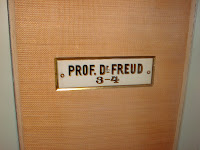

That's me on the couch at the Sigmund Freud Museum, though of course not on the couch that Freud used for his patients. It was the main object in a room at the museum and represents, I suppose, a contemporary version of the psychoanalytical setting. What struck me most at the museum was the way Freud surrounded himself in his work by objects that figured in his thinking about the psyche.

Six days of sightseeing, even in a city as interesting as Vienna, are plenty. One has to be selective, and the only thing I really missed out on, for the true Vienna experience, was the opportunity to attend a performance at the famous Burgtheater or the opera. On the other hand, there was this public toilet where, for 60 cents, you could use the facilities and hear music by Johann Strauss.
I naturally made it to the Schönbrunn, the summer residence of the Habsburgs, a few miles from city center. The rest of the year they resided in the Hofburg (thus, the "Burg" theater) Here I am in the "backyard" of Schönbrunn with Anna Paula, a lovely Brazilian gal I met on the city bus tour.


Another charming residence was the Albertina, that of Archduke Albert (1738-1822) and his wife, Marie Christine, favorite daughter of Maria Theresa.
Here (on the left) you have the staircase, leading up to what are called the "Prunkräme" (below right), meaning "sumptuous rooms," and indeed they are that.

Not to forget the more intimate writing room (below left), with a picture of Maria Theresa on the wall in the back. The Albertina is also a museum, with a changing collection of artwork.

More to come in my next posting, especially on the art I saw and my reflections on the difference between "classical" and "modern" art.


 But see what a good job my new camera does! I had been without one for months.
But see what a good job my new camera does! I had been without one for months.





















